“I think we dream so we don’t have to be apart for so long. If we’re in each other’s dreams, we can be together all the time.”
~Winnie-the-Pooh
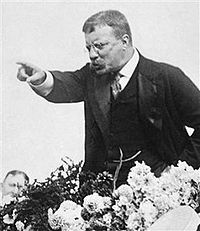
1912 – Before a campaign speech in Milwaukee, Wisconsin, Theodore Roosevelt, the presidential candidate for the Progressive Party, was shot at close range by saloonkeeper John Schrank while greeting the public in front of the Gilpatrick Hotel.
Schrank’s .32-caliber bullet, aimed directly at Roosevelt’s heart, failed to mortally wound the former president because its force was slowed by a glasses case and a manuscript in the breast pocket of Roosevelt’s heavy coat – a manuscript containing Roosevelt’s evening speech.
Roosevelt, who suffered only a flesh wound from the attack, went on to deliver his scheduled speech (as shown above) with the bullet still in his body.
After a few words, the former “Rough Rider” pulled the torn and bloodstained manuscript from his breast pocket and declared, “You see, it takes more than one bullet to kill a Bull Moose.”
He spoke for nearly an hour and then was rushed to the hospital.
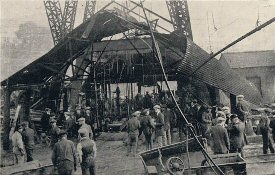
1913 – 439 workers died in a massive coal-mine explosion at Senghenydd colliery (coal mine) eight miles from Cardiff in Wales.
The incident was one of Britain’s worst-ever mining disasters. The mine consisted of two pits, side by side, which held nearly 1,000 miners in total.
At 8:12 a.m., a tremendous explosion ripped through one of the pits. Dust and debris were sent hundreds of feet into the air and bright red and orange flames went nearly as high.
Nearly 500 miners were brought up safely, but with no further signs of life evident, mine officials, concerned about the stability of the mine, decided to seal the mine and leave the rest of the bodies deep within the earth.
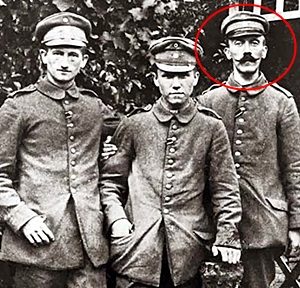
1918 – Among the German soldiers wounded in the Ypres Salient in Belgium was Corporal Adolf Hitler, temporarily blinded by a British gas shell and evacuated to a German military hospital at Pasewalk, in Pomerania.
While there, Hitler learned (on November 11) of Germany’s defeat and was outraged by the subsequent Treaty of Versailles, which forced Germany to admit to starting the war, deprived Germany of various territories, demilitarised the Rhineland (which the Allies occupied), and imposed economically damaging sanctions.
Hitler later wrote: “When I was confined to bed, the idea came to me that I would liberate Germany, that I would make it great.”

1926 – Winnie-the-Pooh, by A. A. Milne, was published in book form.
The character of Winnie-the-Pooh had first appeared by name on December 24, 1925, in a Christmas story commissioned and published by the London newspaper The Evening News.
The Evening News Christmas story reappeared as the first chapter of Milne’s book, which has been translated into many languages, including Latin.
The Latin translation was first published in 1958, and, in 1960, became the first foreign-language book to be featured on the New York Times Best Seller List,
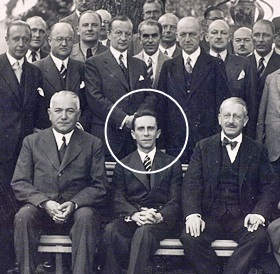
1933 – Nazi Germany renounced its role in the Conference for the Reduction and Limitation of Armaments.
Germany, whose army and navy already were limited by the Treaty of Versailles, demanded that other states disarm to German levels and, in the event they refused to do so, claimed a right to build up its armed forces.
France, which feared the revival of German power, argued that security must precede disarmament and called for security guarantees and the establishment of an international police force before it would reduce its own forces.
Determined to rearm, Germany – represented at the conference by Propaganda Minister Joseph Goebbels (as shown above) – rejected all proposals that did not accord it immediate military parity with the Western powers.
Germany’s move set the stage for its complete withdrawal from the League of Nations a week later.
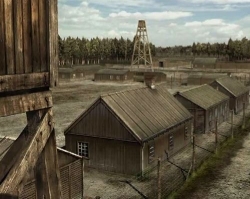
1943 – Prisoners at the Nazi German Sobibór extermination camp in Poland revolted against the Germans, killing eleven SS guards, and wounding many more.
About 300 of the Sobibor Camp’s 600 prisoners escaped, and about 50 of these survived the end of the war.

1944 – Field Marshal Erwin Rommel, Germany’s legendary “Desert Fox,” was given the option of facing a public trial for treason (as a co-conspirator in the plot to assassinate Adolf Hitler) or taking cyanide.
He chose the latter.
The German government gave Rommel a state funeral and attributed his death to war wounds.
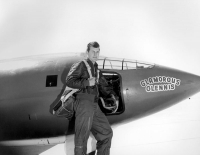
1947 – U.S. Air Force Captain Chuck Yeager became the first person to fly faster than the speed of sound.
Yeager flew the Bell X-1 (nicknamed Glamorous Glennis) over Rogers Dry Lake in Southern California. The X-1 was lifted to an altitude of 25,000 feet by a B-29 aircraft and then released through the bomb bay, rocketing to 40,000 feet and exceeding 700 miles per hour.
Because of the secrecy of the project, Bell and Yeager’s achievement was not announced until June 1948.
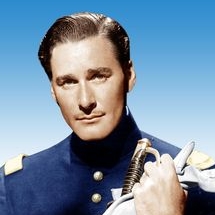
1959 – Actor Errol Flynn died of a pulmonary embolism at the age of 50.
He starred in Captain Blood, The Charge Of The Light Brigade, The Adventures Of Robin Hood, They Died With Their Boots On (and many more).
Flynn Factoid: Flynn went to Cuba in late 1958 to film the self-produced (and horrible) Cuban Rebel Girls. It was his final acting role.
While there, he met Fidel Castro and was an enthusiastic supporter of the Cuban Revolution.
He wrote a series of newspaper and magazine articles for the New York Journal American documenting his time in Cuba with Castro.
Flynn was the only journalist who happened to be with Castro the night Cuban President Fulgencio Batista fled the country and Castro learned of his victory in the revolution.
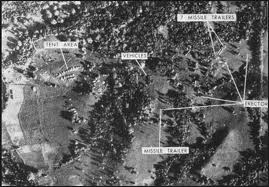
1962 – Although the Cuban Missile Crisis began in earnest on October 16, it was on this date that a U-2 flight piloted by Major Richard Heyser took 928 pictures which captured images of a SS-4 construction site at San Cristóbal, Pinar del Río Province (now in Artemisa Province), in western Cuba.
The following day, the CIA’s National Photographic Interpretation Center reviewed the photographs and identified objects that they interpreted as medium range ballistic missiles.
The discovery offered incontrovertible evidence that Soviet-made missiles in Cuba – capable of carrying nuclear warheads – were now stationed 90 miles off the American coastline and led the United States and the Soviet Union to the brink of nuclear conflict.

1964 – Civil rights leader Dr. Martin Luther King, Jr., was awarded the Nobel Peace Prize for his nonviolent resistance to racial prejudice in America.
At 35 years of age, the Georgia-born minister was the youngest person ever to receive the award.
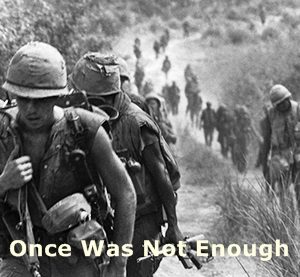
1964 – U.S. Defense Department officials announced that the Army and Marines would be sending 24,000 men back to Vietnam for involuntary second tours of duty.
The reasons given were the length of the war (odd, considering the U.S. involvement in Vietnam was still relatively new), high turnover of personnel resulting from the one year of duty, and the tight supply of experienced soldiers.
This decision had an extremely negative impact on troop morale and the combat readiness of U.S. forces elsewhere in the world as troops were transferred to meet the increased personnel requirements in Vietnam.
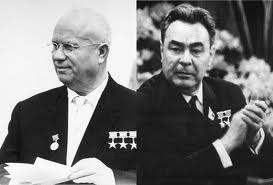
1964 – Nikita Khrushchev was ousted as both premier of the Soviet Union and chief of the Communist Party after 10 years in power.
He was succeeded as head of the Communist Party by his former protégé Leonid Brezhnev, who would eventually also become the chief of state.
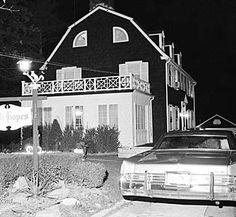
1975 – Ronald DeFeo Jr. went on trial for the killings of his parents and four siblings in their Amityville, New York, home.
His attorney argued for an insanity defense; however, that November, he was found guilty of six counts of second-degree murder and later sentenced to six consecutive sentences of 25 years to life in prison.
In 1977, Jay Anson published The Amityville Horror. The book became a best-seller and inspired a 1979 movie of the same name.
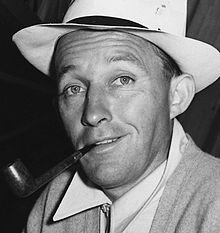
1977 – Actor and singer Bing Crosby suffered a fatal heart attack after finishing a round of golf at a course near Madrid, Spain.
As an actor, he starred in (The Bells Of St. Mary’s, The Country Girl, Going My Way (for which he won the Academy Award for Best Actor), and of course, the “The Road To…” series of comedies with Bob Hope.
As a singer, his output was legendary; (Swinging On A Star, Too-Ra-Loo-Ra-Loo-Ra’, White Christmas (and many, many more)
His final words, as he approached the clubhouse, were, “That was a great game of golf, fellas.”
He was 74.
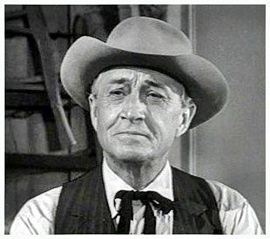
1983 – Actor Paul Fix died of kidney failure at the age of 82.
Fix appeared in more than 300 feature films and dozens of television shows over a 56-year career, but was best known for portraying Marshal Micah Torrance, opposite Chuck Connors’s character in The Rifleman from 1958 to 1963.
Fix Factoid: In the 1930s, Fix met John Wayne and became his acting coach. He would eventually appear as a featured player in 27 of Wayne’s films, including The Fighting Seabees, Back to Bataan, The Sons of Katie Elder, and The Undefeated.
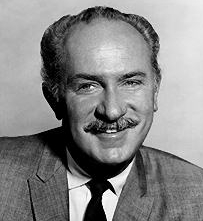
1986 – Actor Keenan Wynn died of pancreatic cancer at the age of 70.
The son of vaudeville comedian and acting legend Ed Wynn starred in The Man In The Gray Flannel Suit, Dr. Strangelove, and The Absent-Minded Professor, to name just a few.
The Wynns, father and son, both starred in the original 1956 Playhouse 90 television production of Rod Serling’s Requiem for a Heavyweight.
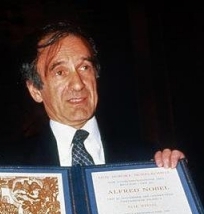
1986 – Holocaust survivor and human rights advocate Elie Wiesel was named winner of the Nobel Peace Prize.

1987 – A media frenzy occurred when hundreds of rescuers came to the aid of little 18-month-old Jessica McClure, who had fallen 22 feet into an abandoned well in her backyard in Midland, Texas.
She was brought out of the well 58 hours later and was rushed to the hospital, where she underwent minor surgery. Gifts, especially stuffed animals, pouring into the hospital from well-wishers, most of whom had never met Jessica or her family.

1990 – Composer and conductor Leonard Bernstein (West Side Story, On The Town, On The Waterfront) died from emphysema at the age of 72.

1994 – Pulp Fiction opened in theaters.
The film earned more than $100 million at the box office and was also a huge critical hit, winning the Palme d’Or at the Cannes Film Festival and earning seven Academy Award nominations, including Best Picture.
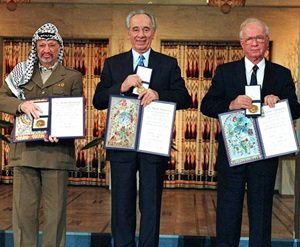
1994 – Palestine Liberation Organization chairman Yasser Arafat, Israeli Foreign Minister Shimon Peres, and Israeli Prime Minister Yitzhak Rabin shared the Nobel Peace Prize “for their efforts to diminish the part played by nuclear arms in international politics and in the longer run to eliminate such arms.”
The photo shows the three accepting their awards on December 10, 1994 (left to right: Arafat, Peres, Rabin).

2003 – A Chicago Cubs fan named Steve Bartman plucked a fly ball out of the air before outfielder Moises Alou could catch it – a catch that would have been a crucial out – in the sixth game of the league championship series against the Florida Marlins.
Bartman was escorted from Wrigley Field by security guards as bloodthirsty fans hurled beer cans and other debris at his head. Florida won the game – and the seventh and deciding game the next day.

2012 – Austrian daredevil Felix Baumgartner jumped from a capsule attached to a helium balloon approximately 24 MILES above Earth.
He became the first person to break the sound barrier without the protection or propulsion of a vehicle.
After making his record-setting jump, which was witnessed live by a global audience via cameras mounted on his capsule, the 43-year-old Baumgartner landed safely in the desert near Roswell, New Mexico.
Compiled by Ray Lemire ©2019 RayLemire.com / Streamingoldies.com. All Rights Reserved.
Ok Ray, you will be missed from these lessons. Totally enjoyed this one.
Why, thank you, Patty … but I’m not going anywhere just yet.
Soon but not yet. 🙂
The Cuban Missile Crisis, we did not understand how close we were to nuclear war. Our parents did and this was evidenced by their reaction to the news broadcasts. I will not ever forget their reactions as we gather around the evening news.
Many noteworthy events on this date.
Thanks Ray
Thanks, Marty. I am constantly amazed how our parents “got by” with just 3 channels of information. I could always tell when the subject was serious because we (the kids) were told to be quiet so Dad and Mom could focus on what was being said.
A lot of info today but tomorrow is going to be one of those WOW days!
Gordie was on the USS Enterprise at the time of the Cuban Crisis. They were at Norfolk and many were off the ship on leave. They were then ordered to Cuba leaving those who were not able to return in time – to prepare for the worst. Loved Bing Crosby and his mellow music …. and remember when the McClure child was pulled from the well in Texas …. Thanks Ray for another great compilation of historic events ….
Barbara, the Cuban missile crisis holds some personal (and worrisome) memories for Gordie and you. It was a scary time but I think JFK handled it so well.
I’m happy the column brought back so many memories for you.